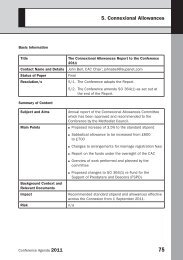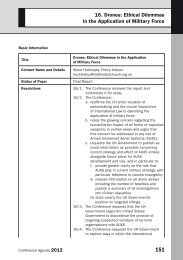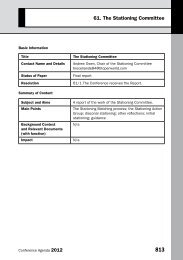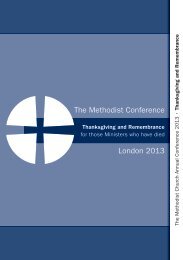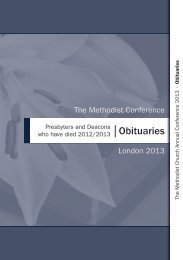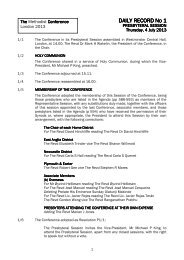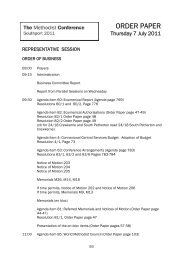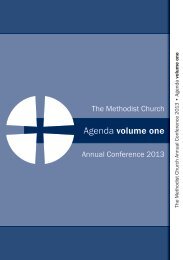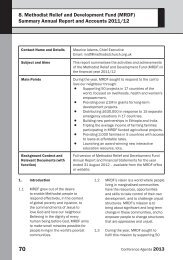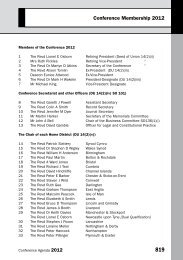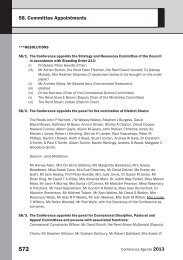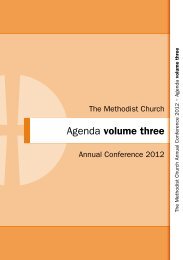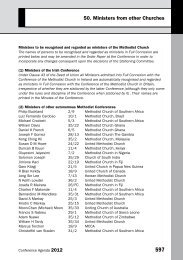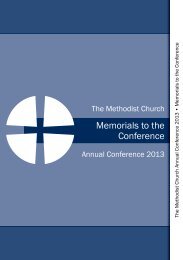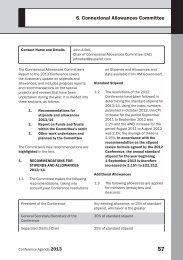Agenda Volume 2 - Methodist Conference
Agenda Volume 2 - Methodist Conference
Agenda Volume 2 - Methodist Conference
Create successful ePaper yourself
Turn your PDF publications into a flip-book with our unique Google optimized e-Paper software.
34. The Future of Wesley House, Cambridge<br />
10. The Trustees have taken advice<br />
from their solicitors, Messrs Taylor<br />
Vinters, on their duties now that<br />
it will soon become impossible to<br />
carry out their trusts in full. They<br />
have been advised that by virtue<br />
of the Charities Act 2011 they are<br />
under a duty to apply to the Charity<br />
Commission for a scheme which will<br />
enable them to apply the trust assets<br />
“cy‐près” (as near as possible to the<br />
original purposes). The Trustees have<br />
also been advised that when the<br />
Charity Commission makes a cy-près<br />
scheme, it must have regard to the<br />
following matters:<br />
(1) the spirit of the original gift;<br />
(2) the desirability of securing<br />
that the property is applied for<br />
charitable purposes which are<br />
close to the original purposes;<br />
and<br />
(3) the need for the relevant<br />
charity to have purposes which<br />
are suitable and effective in<br />
the light of current social and<br />
economic circumstances.<br />
“The relevant charity” means the<br />
charity by or on behalf of which the<br />
property is to be applied under the<br />
scheme.<br />
11. The Trustees’ solicitors have<br />
identified five elements in the<br />
intention recorded in the Trust Deed:<br />
(i) a college, hostel or institution (ii)<br />
in the University of Cambridge (iii) for<br />
theological and pastoral education<br />
(iv) of accepted candidates for<br />
ordained ministry (v) of the Wesleyan<br />
<strong>Methodist</strong> Church or its successor.<br />
According to the Trust Deed the<br />
purpose was that students might<br />
have the full benefit of University life<br />
and tuition alongside those elements<br />
distinctive to a <strong>Methodist</strong> formation.<br />
(The Appendix to this report gives a<br />
little more detail about the founder’s<br />
original intention.) In exploring<br />
proposals for new ways of using the<br />
trust assets which could form the<br />
basis of an application to the Charity<br />
Commission for a cy-près scheme,<br />
the Trustees are bearing in mind<br />
their solicitors’ advice that element<br />
(iv) is the one which at present<br />
requires amendment, because that<br />
is the element which clearly can<br />
no longer be satisfied as matters<br />
currently stand. As explained further<br />
in Section C, the Trustees believe<br />
that there are significant elements of<br />
the Fruitful Field proposals to which<br />
Wesley House can contribute while<br />
giving effect to the other elements<br />
of the founder’s intention. It will also<br />
be appreciated that any modification<br />
of element (iv) could take the form<br />
of widening it so that the charitable<br />
purposes extend to the further<br />
theological and pastoral education of<br />
ministers who are already ordained<br />
and, if thought appropriate, the<br />
theological and pastoral education<br />
of lay persons who are not accepted<br />
candidates.<br />
12. The broad outlines of the legal<br />
context were before the <strong>Conference</strong><br />
of 2012. The Fruitful Field rightly<br />
describes Wesley House as an<br />
“independent <strong>Methodist</strong> entity<br />
358<br />
<strong>Conference</strong> <strong>Agenda</strong> 2013



